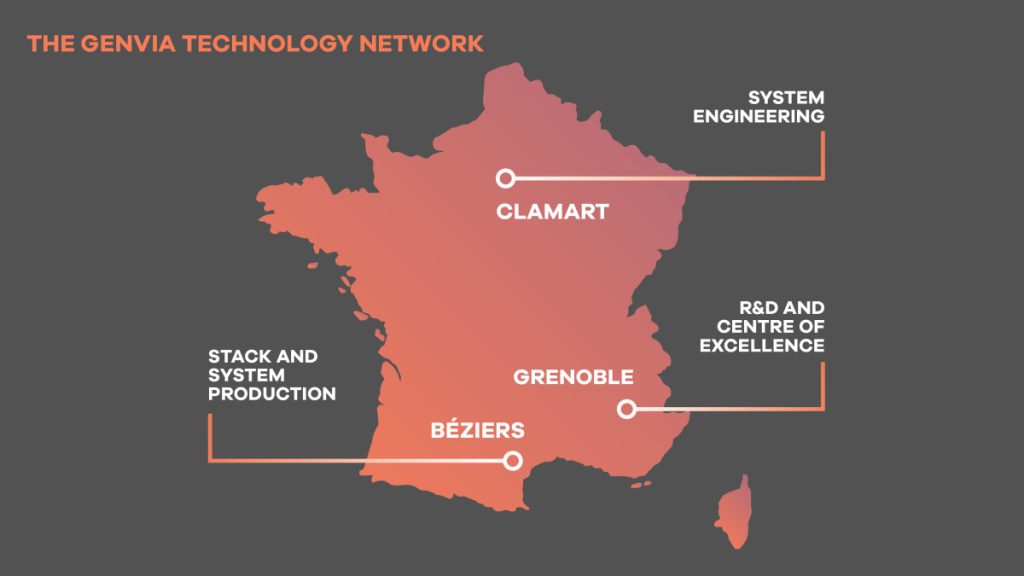The result of more than a decade of pioneering R&D work, Genvia’s electrolyser technology is the result of a long-term commitment that began more than 15 years ago.
Discover our technology
Genvia’s advanced Solid Oxide Electrolyser Cell (SOEC or SOEL) stack configuration features a robust solid oxide electrolyte, combined with optimized anode and cathode technologies, enabling hydrogen production through high-temperature electrolysis. H2 production via our high-efficiency electrolysis module is in contrast to solid oxide fuel cell (SOFC) designs that generate electricity from hydrogen.
Committed to continuous improvement
With key sites at strategic locations across France, the Genvia technology network accelerates the continuous development of electrolyser solutions at scale that are commercial, cost-effective, reliable and sustainable.
And, by enabling customers to produce hydrogen on site, our work reduces external dependencies and transportation requirements while protecting local jobs.

Genvia’s high-efficiency solid oxide electrolyser technology is a vital part of clean, efficient, high-performance industries of the future.
The technology delivers more electrically-efficient electrolysis performance when compared to existing PEM and alkaline-based systems. Due to the waste heat produced, these technologies cannot achieve the high level of energy efficiency needed to be a viable long-term alternative for industrial applications.
By contrast Genvia technology is being engineered specifically to meet the needs of industrial specifications, systems and solutions at
scale. Genvia solutions represent the culmination of systems engineering design, based on a deep understanding of the challenges faced by our cement, chemical and steel partners in decarbonising their plants.
Genvia will reduce lifecycle costs for customers by:
- Increasing the power density of each stack
- Scaling up manufacturing to reduce cost per stack
- Scaling projects to optimise balance of plant (BOP) costs
Genvia will extend the lifetime of every electrolyser by:
- Reducing cell degradation
- Designing a fault-tolerant system
- Developing zero-defect manufacturing
Genvia’s approach delivers the most energy-efficient electrolysis performance available at scale, with up to 40% more hydrogen produced for every kWh of electrical energy input.
The Genvia approach allows you to make the greatest use of the heat, chemical and electrical energy present within the electrolysis system.
For industrial applications likely to consume high volumes of hydrogen, the economic viability of using an electrolyser for decarbonisation is defined by the costs of electricity.
Genvia’s thermally-charged electrolysis process actively consumes industrial heat so that less additional energy is needed to split the water; reducing the electrical input required to produce each kg of hydrogen.
This approach delivers the most energy-efficient electrolysis performance available at scale, with up to 40% more hydrogen produced for every kWh of electrical energy input.
Thermally-charged electrolysis accepts heat input via three distinct mechanisms:
Steam generation at 150°C
Feed gas preheating at 150-750°C
Directly into the stack at 750-800°C
Genvia reduces electrical input requirements by:
Optimising reaction conditions
Chasing every joule of loss
Swapping electrical for heat energy


